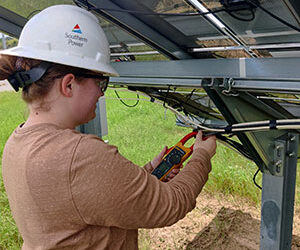What do a management consultant, an accountant, a travel and event planner, and a testing and verification specialist have in common? They are all energy professionals who started their careers in different fields, and they all have words of advice for others looking to transition careers.
Energy career enthusiasts, Tracy DiSanto, Carla Gregory, Kay Johnson, and Stephanie Krabbe recently spoke to those considering changing careers about how to transition to energy from other fields, explain what surprised them most about working in the energy sector, and offer advice.
Natural Transition Paths to Energy

Stephanie (Metzler) Krabbe
Stephanie Krabbe is a former travel and event planner in the real estate industry and now the Vice President of Workforce Development at Mears, a national contractor that offers engineering, design and construction services to the pipeline and utility industries. Krabbe notes that most every industry provides a relatable entry point to transition into an energy career. “We need people in customer service, accounting and finance, engineering, and skilled trade positions, to name just a few. Take stock of your career experience and explore how it will benefit employers,” encourages Krabbe.
Avangrid’s Director of Talent Acquisition and former testing and verification manager, Kay Johnson, echoes Krabbe’s sentiments, explaining, “We need all talent! We need thought leaders, folks that are innovative, people to help with the transformation the energy sector is going through.”
There is universal agreement that anyone coming from a trade background will have skills portable to an energy career. The industry sees a lot of transition from those who have worked in construction, telecom, tree trimming, water or sewer work, and the military as they all offer readily adaptable knowledge, skills, and abilities for energy careers. Those transferring into skilled trade positions can expect to make a good living, often earning as much as (sometimes more than) those who graduate with four-year college degrees.
Eye Opening Understanding of Energy Careers

Tracy DiSanto
Career changers are often surprised by much of what awaits them when they work in the energy field. Carla Gregory, VP Talent and Organization Performance at Avangrid and a former management consultant, was initially surprised at the amount of innovation in the industry. Gregory shared that she now accepts strategic action and change as the norm, as the industry explores a national infrastructure for electric vehicles, smart grids, and energy storage, and conducts research partnerships with many of the country’s leading academic institutions. She shares enthusiasm for the “exciting, adventurous, and forward-thinking industry that is committed to sustainability and innovative uses of technology.”
When Tracy DiSanto, a Senior Manager of Workforce Planning, Development and Compliance, formerly a public accountant with a large firm, first joined DTE, she said she was initially most surprised about the industry’s focus on the environment and community stewardship. She thought of energy companies as functional entities, providing essential services, not realizing their social responsibility focus. DiSanto’s eyes have been opened to the work these companies do to take care of the planet that will impact generations to come. She has also taken to heart the work her company does, like others in the industry, to care for its local communities. She has a passion for helping those who have been marginalized and under-served in the workforce and returning citizens, those who are ready to seek employment after incarceration.
The breadth of opportunity and career path progression are also often cited as a surprise to industry newcomers. Energy companies provide tremendous investments in training. There are endless stories about employees who start in skilled trade positions and progress to an array of more senior roles, including crew managers, training specialists, company executives, and even corporate presidents.
Advice for Career Changers

Kay Johnson
Johnson noted that people of color and women are less likely to apply for a job if they don’t meet every criterium in a job description. She encourages those considering a career change to be “Aggressive in pursuit of what they want and apply for jobs of interest if they meet the basic requirements and have skill sets that are transferrable.”
Other tips? Our team of career changers offers these helpful ideas:
- Position your resumé to what is most relevant to the job for which you are applying and make sure it isn’t buried at the bottom.
- Use professional networking platforms like LinkedIn.
- Reach out to recruiters at energy companies, even if you are just looking to learn more about how to prepare yourself for an energy career in the future. Have conversations about the skills you have and what you need to do to prepare for job of interest.
- Do research. Know what’s going on and understand basic industry lingo to demonstrate initiative.
- Don’t be afraid to take a step backward to move forward. If you want to make a career change, you may need to get a foot in the door in an entry level position, but don’t expect to stay there forever. This is an industry that will reward you if you have the drive, initiative, and willingness to work hard.
- Understand employment requirements for jobs that may interest you. For instance, many skilled trade positions will require candidates to obtain a Commercial Driver’s License, pass entrance exams, and successfully complete drug testing.
- Energy companies often refer candidates to one another. If you develop a good relationship with a recruiter, he or she may share your resumé with a colleague that may have an opening that matches your skillset. Use every point of contact to its fullest.
- Persistence matters.
Those who work in energy jobs agree that you never know where your career path will take you and what doors will open for you when you work in this sector. In fact, many energy professionals boast of their frequent career changes – all within the same energy company – as employers recognize and respond to their interests, aptitudes, and potential.




